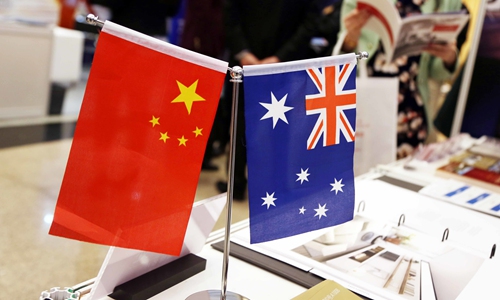HOME >> OPINION
Politics shouldn’t step into China-Australia educational ties
By Ai Jun Source:Global Times Published: 2020/1/9 21:08:40

Photo: VCG
Many Chinese students' visa applications to Australia have been blocked. 135 Chinese PhD candidates and 30 visiting students wrote a joint letter to the Global Times recently, claiming that they have been waiting for visas for months or even over a year after being accepted by Australian universities.
International education, Australia's third-largest export sector, plays a vital role in the country's revenue and rising employment rate. Chinese students take up 38 percent of all international students at Australian universities.
Reports have shown that scholars from China and Australia have been workings on research programs such as enabling conditions for climate change mitigation, tissue engineering and regenerative medicine, with significant achievements.
The majority of international students from China studying in Australia choose to return to China after completing their studies. They normally become a link between the two countries in various fields, especially political and business circles. In other words, they are of importance to Australia's soft power diplomacy.
Nevertheless, an increasing number of Chinese students are feeling the chill when attempting to continue their research and studies in Australia.
Some said this has to do with the cooling ties between Beijing and Canberra. Over the past years, Australia has been full of paranoid voices against China. The conspiracy theory that Chinese students are infiltrating Australian campuses is hyped from time to time - not to mention the case of Wang Liqiang, a self-claimed defecting Chinese spy, who was under the glare of Australian media as proof of so-called Chinese infiltration, although Wang was later found to be a fraudster and the case turned out to be farce.
Australia's Department of Home Affairs perfunctorily responded that the authorities have to run health, character and national security checks on the applicants.
It is hoped this has nothing to do with the cooling China-Canada relations. These Chinese students are now in a predicament, with the possibility that their scholarships, offers or language scores would expire. Their previous study or research plans have been disrupted.
Future educational exchanges between the two countries will inevitably be affected by the case and the result will surely not make Australia feel any better.
Facts have proven that China-Australia economic cooperation has not only been stable, but also brought substantial benefits to people from both sides. With the rapid development of Chinese technologies, the highlight of bilateral collaboration is no longer confined to the economy and trade. In December 2019, the Australia-China Relations Institute of the University of Technology Sydney issued a report saying "China is Australia's leading AI research partner by a large margin."
It is time for Australia to respond to the case more proactively and not make academic exchanges and joint research cannon fodder of ill-intentioned political hype.
Posted in: OBSERVER